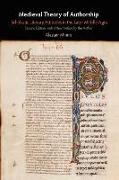- Start
- Medieval Theory of Authorship
Medieval Theory of Authorship
Angebote / Angebote:
An innovative and important book."--Speculum"This valuable book . . . poses in a most interesting form the question of the relationship generally between literary theory and literary practice."--Times Higher Education Supplement"Stimulating and learned. . . . This book should serve as a milestone in medieval literary theory."--Yearbook of English Studies"No professional medievalist with a serious interest in literature can afford to leave this book unread."--British Book News"A work of great importance. . . . Minnis's effort takes its own direction and impressively breaks new ground . . . he has helped lay the course theoretical criticism of medieval literature will have to pursue for years to come. It is this originality which most makes Medieval Theory of Authorship the important book that it is."--Studies in the Age of ChaucerIt has often been held that scholasticism destroyed the literary theory that was emerging during the twelfth-century Renaissance, and hence discussion of late medieval literary works has tended to derive its critical vocabulary from modern, not medieval, theory. In Medieval Theory of Authorship, now reissued with a new preface by the author, Alastair Minnis asks, "Is it not better to search again for a conceptual equipment which is at once historically valid and theoretically illuminating?"Minnis has found such writings in the glosses and commentaries on the authoritative Latin writers studied in schools and universities between 1100 and 1400. The prologues to these commentaries provide valuable insight into the medieval theory of authorship. Of special significance is scriptural exegesis, for medieval scholars found the Bible the most difficult text to describe appropriately and accurately.Alastair Minnis is Douglas Tracy Smith Professor of English at Yale University. His is also published by the University of Pennsylvania Press.Short copy:Available again with a new preface, this classic work of medieval literary scholarship argues that discussion of late-medieval literary works has tended to derive its critical vocabulary from modern, not medieval, theory, and offers instead a conceptual equipment which is at once historically valid and theoretically illuminating.
Folgt in ca. 10 Arbeitstagen


